TIDE OF POLLUTION
Plastic, plastic everywhere – decades of talking moves closer to global action
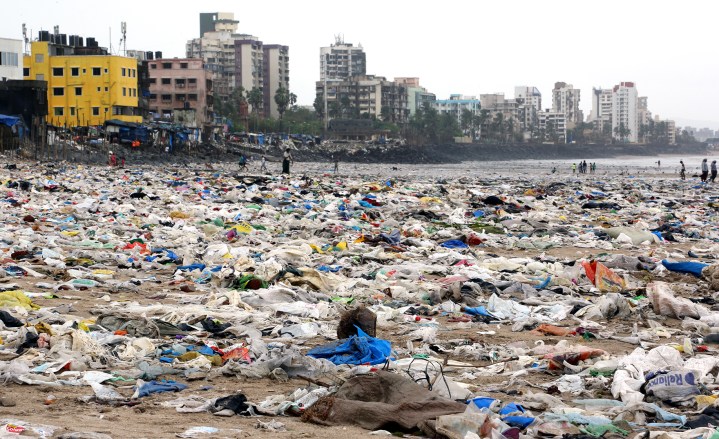
Governments are meeting in Nairobi next week to craft a new global treaty on plastic pollution before the end of 2024. It aims to have an emphasis on reducing plastic pollution of the sea and to promote a new ‘comprehensive approach that addresses the full life cycle of plastic’.
People have been talking for decades about doing “something” to curb the tide of plastic pollution fouling the land and the sea worldwide. Finally, it seems, the talking phase has moved a step closer to action. Next week, governments are meeting in Nairobi, Kenya, to craft a new global treaty before the end of next year.
With an estimated 11 million tonnes of plastic waste pouring into the sea every year, most people recognise that there is a serious problem.
Yet plastic products are now so ubiquitous in our homes and offices that governments (and the billions of people who have come to depend on their convenience) will struggle to find a magic wand powerful enough to banish the problem overnight.
Trade statistics show that the market for plastic continues to grow rapidly. Studies commissioned by the WWF conservation group suggest that global plastic production has almost doubled over the past two decades and is expected to more than triple by 2050.
Several countries have already banned or restricted the use of throwaway plastic shopping bags, one of the most visible manifestations of this crisis. But a cursory look at the piles of synthetic rubbish lining the beaches or floating in the oceans makes it clear that plastic shopping bags are not the only problem.
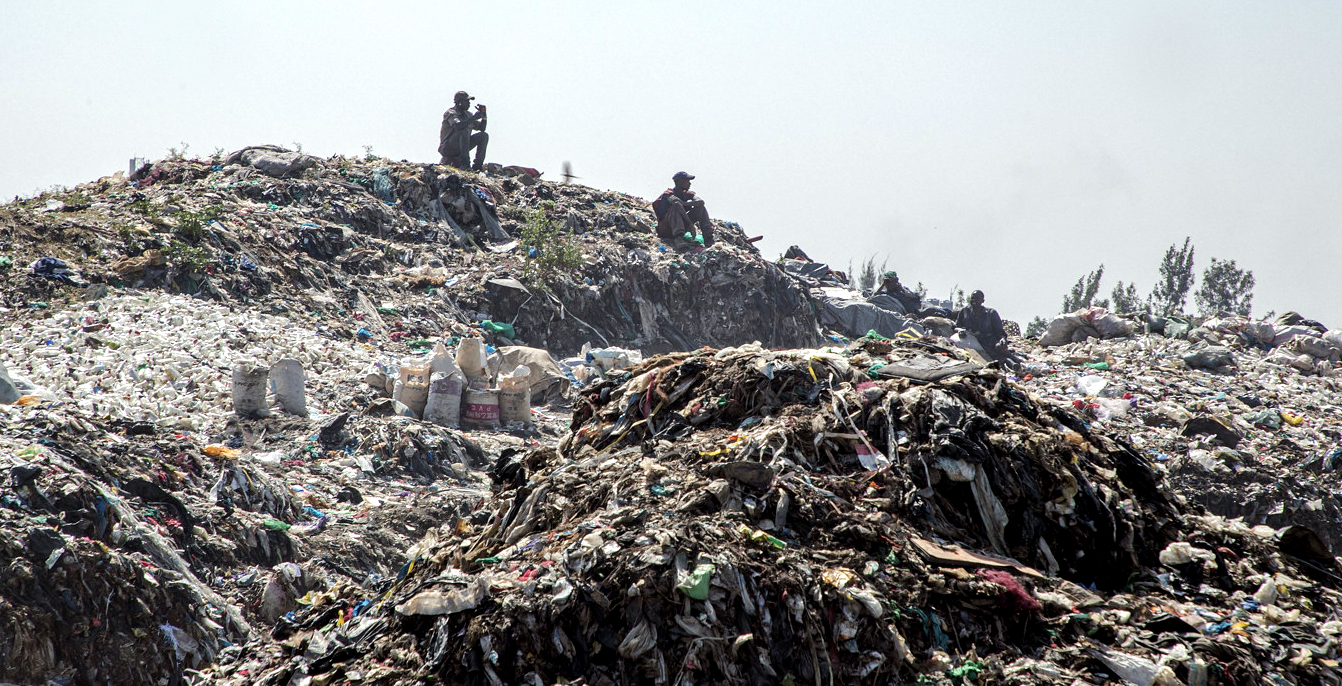
Waste pickers take a break from collecting recyclable valuables at the Dandera dump in Nairobi, Kenya. (Photo: Unep)
Sitting at my desk, I am surrounded by plastic. My pen is made of plastic, along with my phone, printer, computer, electrical plugs, a paperweight, the lid on a bottle of eyedrops…
If there was such a thing as a giant plastic-attracting magnet, there would be very little left in kitchens and fridges across the world.
You know… things like the cling film draped over the dinner leftovers, the milk sachets, the margarine tub, the wrapping used to keep veggies fresh. The list goes on and on.
So, what is to be done?
Emerging treaty
Early last year, at a meeting in the Kenyan capital, members of the United Nations Environment Assembly passed Resolution 5/14 to “end plastic pollution”.
It aims to develop an international legally binding treaty on plastic pollution by the end of 2024, with an emphasis on reducing plastic pollution of the sea and promoting a new “comprehensive approach that addresses the full life cycle of plastic”.
The initial wish list covers more than 20 items, including a focus on “sustainable production and consumption of plastics”. This could extend to better product design and environmentally sound waste management, including a circular economy (where plastic is reused continuously rather than being discarded).
The proposed treaty would also promote national and international efforts to reduce plastic pollution in the marine environment and clean up decades of existing plastic pollution.
Some of the potential low-hanging victories include tougher action on single-use, throwaway plastic products, but even that is not guaranteed considering their low prices and convenience to consumers.
The emerging treaty also envisages new compulsory reporting schemes to measure action on a country-to-country basis and – perhaps most crucially – major drives to raise public awareness about the causes and impacts of plastic pollution.
This is because the problem goes much further than being simply a litter eyesore.
Read more in Daily Maverick: Plastic waste draft treaty is here and South Africa should embrace it
According to a WWF special report prepared by the Geneva-based Dalberg consultancy group, certain forms of plastic pollution now pose growing threats to both human health and natural ecosystems.
Last year, a research journal reported the results of a pioneering biomedical study demonstrating that tiny particles of plastic polymers are bioavailable for uptake into the human bloodstream.
While the authors stressed that further research is needed to understand the potential health hazards to people, other studies have demonstrated a wide variety of negative impacts on marine species exposed to plastic pollution.
For example, as these synthetic products break down in the sea, tiny particles of plastic are eaten or absorbed by plankton and other small organisms that form the base of the seafood chain.
Quite apart from sea creatures becoming entangled in plastic ropes, fishing gear or other plastic debris, fish also ingest plastic fragments that can block their digestive tracts or limit their food uptake by creating a false sense of satiation.
Despite widespread perceptions that they are benign, several common plastic products still contain toxic or other synthetic chemicals that can mimic or antagonise the actions of natural animal or human hormones such as estrogens – raising concern around fertility and harm to developing foetuses.
Many of the chemicals used in the manufacture of plastic food packaging or food contact materials have also not been tested for hazardous properties at all, or the available toxicity data are limited.
It’s also worth remembering that the vast majority of virgin plastics are derived from petrochemical feedstock such as natural gas or crude oil – so the rapid growth of the industry is a significant source of greenhouse gases that drive global heating.
According to the Dalberg report, plastic production will account for up to 20% of the entire global carbon budget by 2040, accelerating the climate crisis.
So, there is a lot at stake for the vested interests of plastics and fossil fuel industries during the negotiations in Nairobi from November 13-19.
Balanced foundation
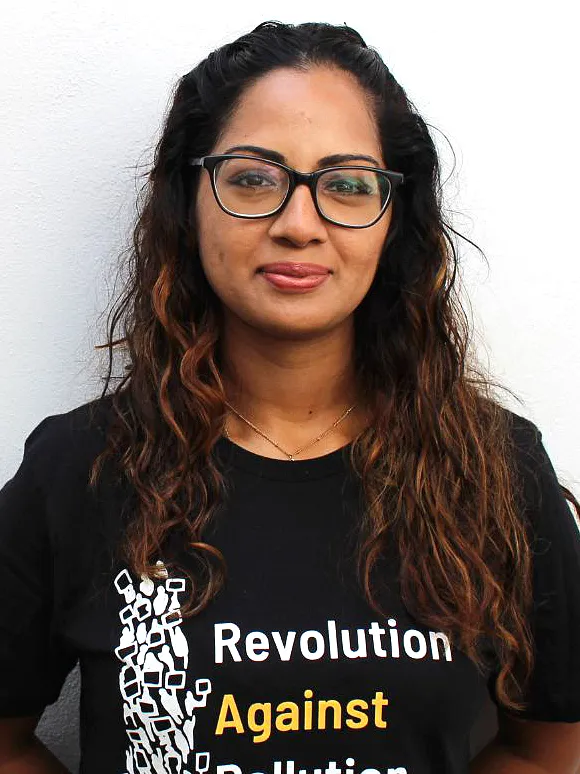
Merrrisa Naidoo. (Photo: Gaia)
The Global Alliance for Incinerator Alternatives (Gaia), one of several civil society watchdog groups monitoring the progress of the plastic treaty negotiations, suggests that the draft negotiating text (known as the Zero Draft) provides a useful starting point.
Durban-based Merrisa Naidoo, who leads Gaia’s Africa Plastics campaign, says that while it is not as ambitious as many parties would like it to be, the Zero Draft is a “balanced” document that provides a foundation to gradually strengthen the proposed treaty over time.
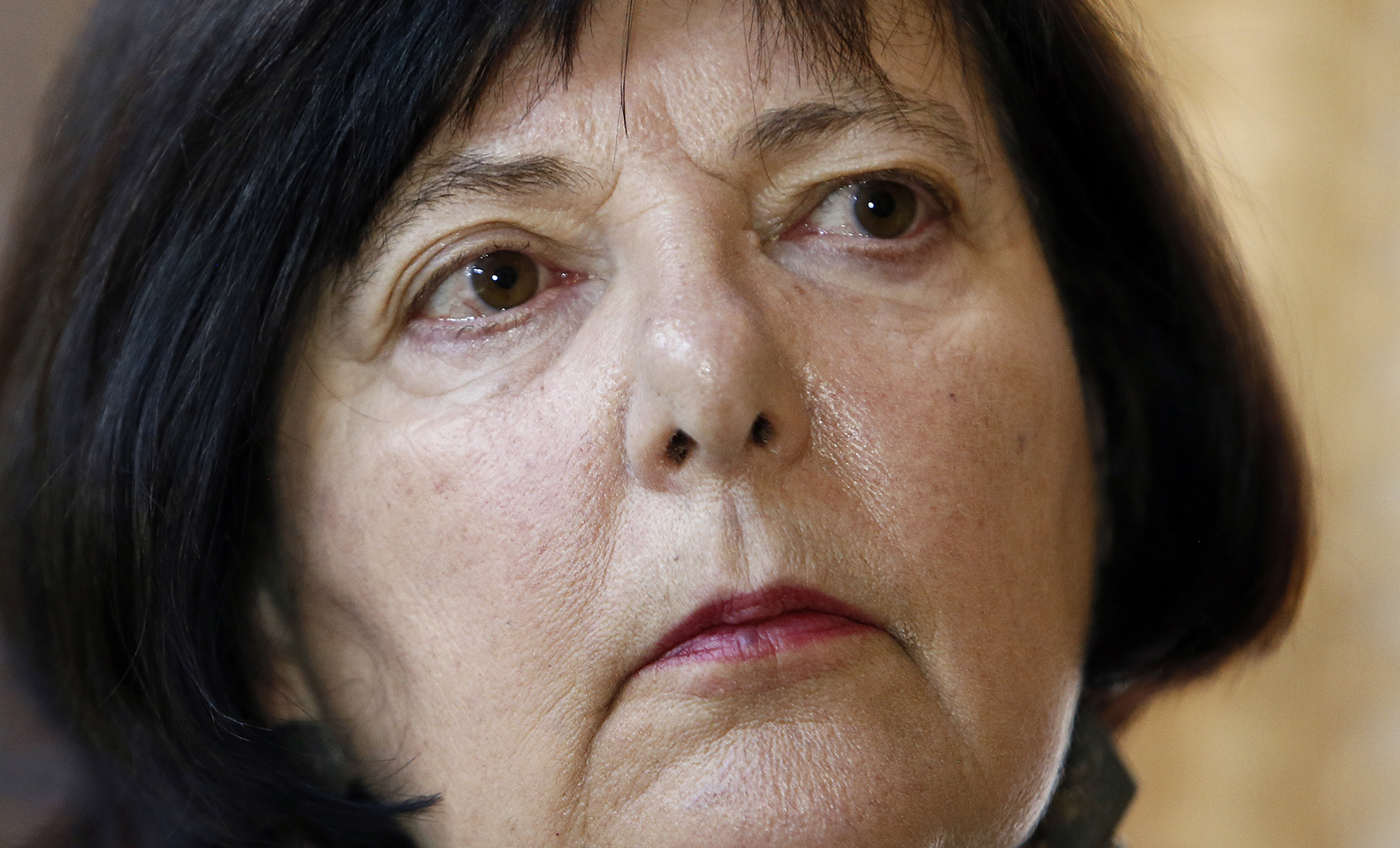
Environment Minister Barbara Creecy. (Photo: Felix Dlangamandla)
Speaking during a webinar on 7 November, Environment Minister Barbara Creecy stressed the need for more transparent disclosure of hazardous chemicals in plastic polymer products.
Speaking on behalf of Gaia and other local civil society groups, Naidoo advocated a policy of “no data – no market access” (where the failure to provide health impact studies by plastic makers would trigger a ban on untested products).
Gaia is worried that there is already strong pushback from several plastics lobby groups, similar to that seen in the abysmally slow climate treaty negotiations.
The organisation noted that during the last plastic negotiation meeting in Paris earlier this year, the first two days were mostly taken up by objections from large oil and plastic-producing countries, who raised procedural issues that delayed discussions on the substance of the treaty.
According to Gaia, some countries (including Saudi Arabia and Russia) wanted to have veto power over the treaty text by advocating for consensus only, with no opportunity for voting if consensus could not be reached.
“This bucks the standard set in other international negotiations like the successful Minamata Convention on mercury, and essentially allows a single country to further delay or even completely block the international community’s ability to get a strong treaty over the finish line.”
Eventually, after lengthy debates, a provisional agreement was reached to proceed on the basis of a two-thirds majority if consensus could not be reached – but because this procedural can had been kicked down the road, it was likely that the same objections would re-emerge in Nairobi next week.
Gaia states that there were at least 190 industry lobbyists at the last meeting who used their power to undermine calls for plastic reduction by promoting tech fixes.
“We’ve all seen how slow and ineffective global climate controls have been, including the noted failures of the Paris (Climate) Agreement, and we don’t have the time to waste on the same mistake,” Gaia cautions.
There are also concerns that the global plastic industry is promoting quick-fix approaches by simply burning plastic waste for energy or using controversial chemical recycling processes to produce new fuel additives or other new forms of plastics.
SA’s approach
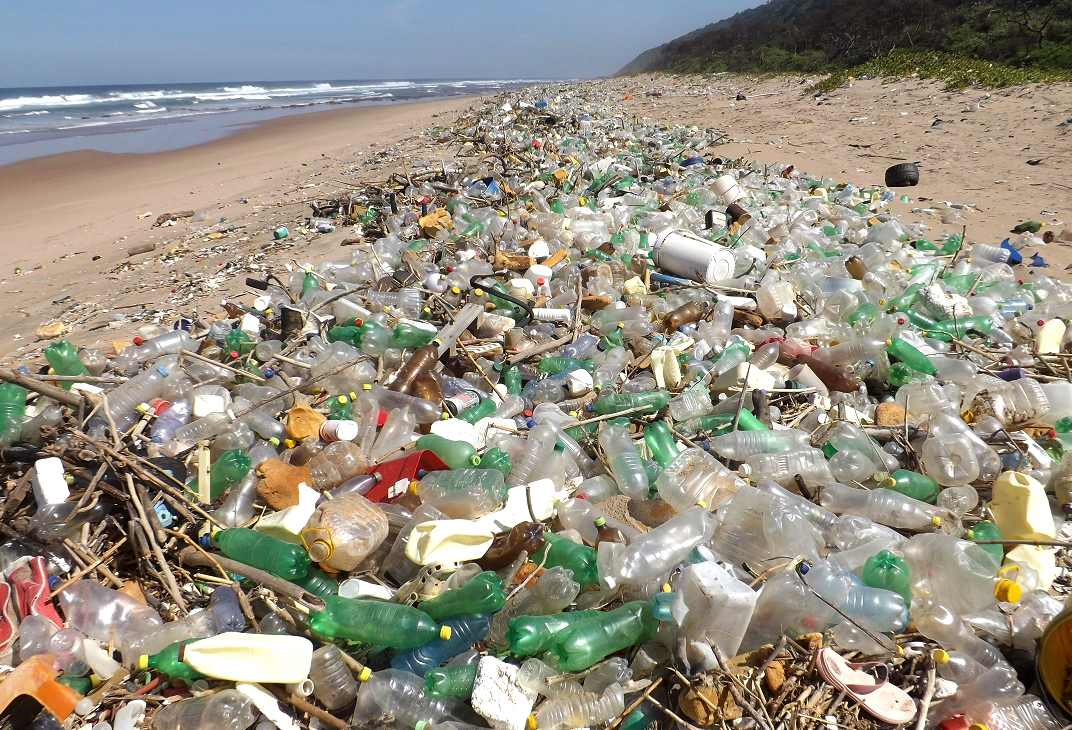
Plastic bottles and other floating debris line a beach south of Durban after a summer rainstorm. (Photo: Lisa Guastella)
Minister Creecy, however, told the webinar that the South African plastics industry employed nearly 60,000 people, “so will be working in consultation with both the plastics industry and organised labour”.
While negotiating in Nairobi, the South African delegation would be guided by the need to reach decisions based on the best available science.
The second guiding principle was the need for open and transparent sharing of information about the chemicals used in plastic production, especially plastic products that come into contact with food.
It was also likely, she said, that the new global treaty would require South Africa to introduce new regulatory controls at a domestic level.
“The fourth issue is finance: should the international instrument lead to obligatory measures to curb plastic pollution, there will be a need for these measures to be supported by equally ambitious means of implementation.
“So, developing countries will argue for a financial mechanism that would ensure predictable and adequate financial resources to assist in curbing plastic pollution in developing countries.”
The environment department’s chemicals and waste management deputy director-general, Mamogela Musekene, said South Africa would also support the establishment of mandatory Extended Producer Responsibility schemes that aim to hold plastic distributors responsible for the pollution caused by their products.
This would compel plastic producers to contribute fees to new structures tasked with managing end-of-life plastic waste.
On the question of short-lived or single-use plastic products, South Africa supported a position where each country would take measures to regulate and reduce the production, sale, distribution, import or export of these products “as appropriate”.
Musekene said the need for the qualifying phrase, “as appropriate”, was because there was a very broad range of single-use plastics where disposable products would still be necessary – particularly in the health sector.
Read more in Daily Maverick: Here’s how to dramatically decrease plastic pollution in three practical steps
Anton Hanekom, executive director of Plastics SA, believes the local industry could play a major role in the development of a new circular economy where “plastics remain plastics as long as possible”.

Executive director of Plastics SA Anton Hanekom. (Photo: Supplied)
“But we have to recognise that we sit with a broken system (in South Africa). A lot of plastic is ending up in the environment because we don’t have the proper waste management systems in place.”
Hanekom said it was estimated that only 39% of the population had access to proper waste management systems, so it was critical to sort and reuse more of this unmanaged waste.
In a separate statement ahead of the Nairobi talks, Hanekom said: “While the likelihood of a global cap on plastic production has decreased, there are growing calls for bans on certain plastic products and additives, ingredient transparency, and taxes to support waste reduction.
“It is our opinion that the Zero Draft text will pose certain challenges for plastic manufacturers. While there may be elements that we as an industry may support, we anticipate that the document will have a top-down approach…
“In contrast, the global plastics community advocates for a bottom-up approach, emphasising the importance of considering the unique challenges and needs of each country before enforcing a legally binding instrument,” Hanekom said. DM



















 Become an Insider
Become an Insider
One way to “dispose” of waste plastic (after all the recyclable plastic is removed) is to turn it into syn-gas. See the company Kibo which is listed on the JSE. They manage to turn the waste to gas (for electricity) without burning it or emitting pollution. Maybe we should all give them some love to clean up our mess?
See KBO Kibo Energy plc on the JSE
Strong paper straws are being manufactured in SA and these are a viable alternative to plastic straws which are single-use and used in great numbers. Paper straws are strong and tested for strength after 4 hours in a water bath. They degrade fully in landfill etc.
pollution is one of the negative externalies that plague capitalism. while it has many virtues, there needs to be a system that results in those making direct profit from pollutants (or precursors to pollution) also having to provide monetarily for the negative affects. these negative effects will continue to weigh heavily on society, requiring those who don’t directly profit from the manufacture of the pollutants to find solutions.
Change begins with ourselves, one individual at a time. Having read (AGAIN) about plastic pollution in the sea in about June of this year, I pledged to never again buy a drink in a plastic bottle. I had a reasonable stock of plastic bottles (awaiting a trip to a town big enough to have a plastic recycling facility) so I simply started to fill them, either with water or with home brewed ginger-beer. Similarly I have not used a disposable shopping bag in over 20 years. If I need a bag to buy loose potatoes or groundnuts (my comfort food of choice) I reuse the bags from my previous shopping. Reusing plastic is a great deal better than recycling, but, eventually my bags and bottles WILL need to be recycled and that requires that every plastic item is clearly identified as to what plastic it contains. I believe there are about 8 different categories and the ONLY place where it is economic to sort them into these 8 types is in the home. It is perhaps surprising but a “blend” of two or three different plastics does NOT produce a plastic mid-way in properties between the two constituents. Rather it produces a useless gooey mess. Therefore an essential first step in any recycling program is to identify the plastic. This is fairly well established in Europe, but sadly almost totally neglected here in Zambia. Good luck to Gaia and the others at the Nairobi conference, but the easiest, lowest hanging fruit, is for each of us to change our own plastic habits. Bruce Danckwerts CHOMA Zambia